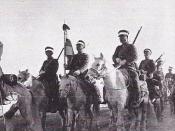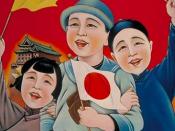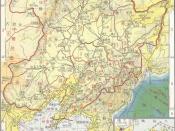Japan's occupation of Manchuria was a major factor leading to World War II. Japan was running out of land, had few valuable natural resources, and was politically unstable. These factors, along with many others, led Japan to become more aggressive, in order to take more land, and to be more jealous of the larger powers. This caused many problems, and would eventually lead to World War II.
During the late 1920's, Japan was a country split with problems. In the mainland it faced a discontent society, a lack of funds with which to buy goods the people needed, and a government filled with unstable politics and corrupt officials. The Japanese people were westernizing and didn't have the money they needed. The Japanese army felt it was their own duty to solve this crisis, and decided to take matters into their own hands. They set several goals, the main one of which was to protect treaties that Japan already had in Manchuria, and also to protect the interests of the people of Japan.
During this period, Japan believed that China was become more aggressive and would hamper their efforts to take new resources. Also, the Japanese feared that the Chinese nationalist party could even ally with the Union of Soviet Socialist Republics, due to recent cooperation between the Nationalist and Communist parties. Japan's excursion into Manchuria was viewed by many as a way of dealing with both economic and social tension. Manchuria was a huge, undeveloped region, which had much to offer for poor, land-deprived Japanese farmers. The region also offered raw materials such as iron and coal for Japanese industry
In order to achieve their goals, the Japanese needed to create an excuse to invade. After the recent war between Russia and Japan, Russia was replaced by Japan...



Nice
Good article
0 out of 0 people found this comment useful.